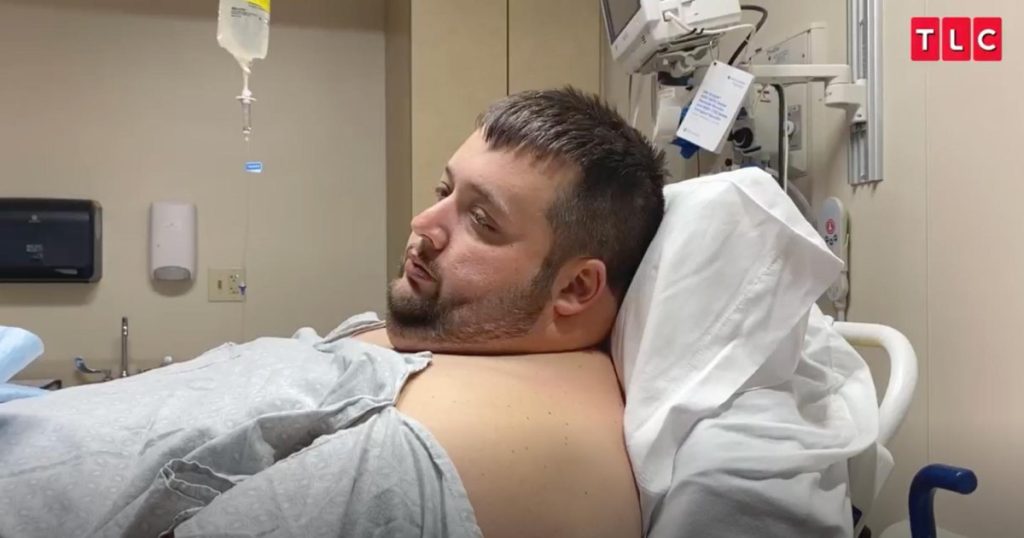Scott Bagwill’s journey towards bariatric surgery took an unexpected and dramatic turn as a sudden spike in his heart rate threatened to derail the life-altering procedure. The high-stakes moment unfolded in the season 3 finale of 1,000-Lb. Best Friends, with Scott lying in the hospital bed, moments away from the operating room, when his heart rate surged into the 150s. Dr. Charles Procter, the surgeon entrusted with Scott’s care, recognized the potential danger and immediately initiated precautionary measures. An EKG was ordered, and contact was made with Scott’s cardiologist to assess the situation and determine the best course of action. The gravity of the situation was palpable as the possibility of canceling the surgery loomed large. Scott’s emotional response, marked by visible distress and tears, underscored the weight of the moment and the profound impact this setback could have on his weight-loss journey. His mother, a constant presence by his side, provided comfort and encouragement, urging him to control his breathing and manage his anxiety.
The sudden escalation in Scott’s heart rate prompted a flurry of activity in the hospital as medical professionals worked diligently to understand the underlying cause. Dr. Procter, in a confessional, highlighted the potential risks associated with such a rapid heart rate, particularly its impact on blood pressure and overall hemodynamic stability. The concern was that if Scott’s heart rate remained uncontrolled, it could render him unfit for surgery, necessitating a postponement that would undoubtedly be a significant blow to his morale and his commitment to his weight-loss goals. The uncertainty surrounding the situation amplified the tension, leaving Scott and his family grappling with the possibility of an unforeseen delay in a procedure that held so much promise for his future.
As medical personnel assessed Scott’s condition, his mother attributed the elevated heart rate to a combination of nerves, anxiety, and his ADHD. While she offered words of reassurance, attempting to calm his fears, Scott’s own internal monologue revealed a deeper layer of concern. He questioned whether his mother’s explanation fully accounted for the severity of the situation, wondering if there might be an underlying medical issue that could complicate the surgery beyond the immediate concern of his rapid heart rate. This internal conflict further underscored the emotional turmoil he was experiencing as he lay in the hospital bed, caught between the hope of finally undergoing the procedure and the fear that a hidden health issue might jeopardize his chances.
Scott’s journey on 1,000-Lb. Best Friends, though relatively brief, had already been marked by controversy and strained relationships. Prior to the dramatic events leading up to his surgery, he had clashed with fellow cast members and faced criticism from viewers. Ashley and Vanessa, two of the show’s mainstays, had expressed their frustration with Scott’s perceived dishonesty about his eating habits, while fans had called him out for his treatment of his mother and what they perceived as insincere emotional displays. These pre-existing tensions added another layer of complexity to Scott’s situation, highlighting the challenges he faced in navigating his weight-loss journey amidst interpersonal conflicts and public scrutiny.
The tension surrounding Scott’s surgery was further exacerbated by an earlier incident in the season involving a heated argument with fellow cast member Tina. During a group trip to the mountains, a seemingly innocuous disagreement about the taste of Scott’s meatballs escalated into a full-blown confrontation, revealing underlying tensions and adding another layer of drama to the group dynamics. This altercation, coupled with Scott’s previous controversies, painted a picture of a complex individual struggling not only with his weight but also with interpersonal relationships and emotional regulation. These challenges provided a backdrop against which the high-stakes drama of his potential surgical setback unfolded, offering a glimpse into the multiple pressures and anxieties he was facing.
The climactic events of the season finale underscored the inherent risks and uncertainties associated with bariatric surgery, even for individuals who have successfully met the pre-operative requirements. Scott’s experience served as a stark reminder that medical procedures, even those considered routine, can present unforeseen complications, and that emotional and psychological factors can play a significant role in a patient’s overall well-being. The episode left viewers on a cliffhanger, anxiously awaiting the outcome of Scott’s situation and the ultimate fate of his surgery. His journey, marked by both personal struggles and moments of resilience, resonated with audiences who followed his progress and empathized with the challenges he faced in his pursuit of a healthier life.

